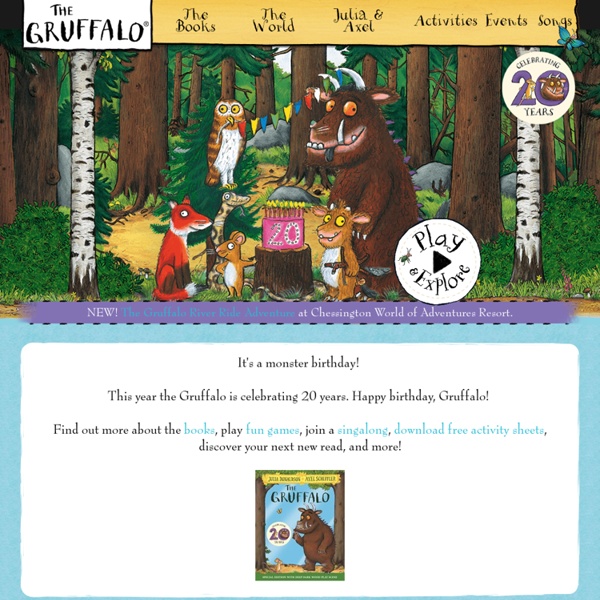



Q & A with Julia Donaldson and Axel Scheffler Author-illustrator team Julia Donaldson and Axel Scheffler have been topping the U.K. bestseller charts over the last decade and a half, with such titles as A Squash and a Squeeze, Room on the Broom, Tabby McTat, and, most famously, The Gruffalo, which recently added to its many honors when the animated movie based on the book was recently nominated for an Oscar. The Gruffalo and its sequel, The Gruffalo’s Child, have changed the expectations of what it is possible for a picture book to achieve not only in terms of sales (The Gruffalo has sold more than four million copies worldwide) but also in terms of profile. In Britain alone, The Gruffalo has been the star of World Book Day as well as the poster image for Children’s Book Week. It has been published in many different formats and adapted for stage and screen. As a result, Donaldson has been a guest on BBC’s iconic radio program Desert Island Discs while Scheffler has designed Christmas cards for former Prime Minister Gordon Brown.
Oxford Owl from Oxford University Press Welcome to our free eBooks collection, developed for children aged 3 - 11 years old. Help your young child learn to read with The Oxford Reading Tree (featuring our much-loved Biff, Chip and Kipper characters), watch your child develop their love of reading with Project X, or simply browse our range of over 200 eBooks for inspiration. All our free eBooks are tablet-friendly. New phonics test will do nothing to improve Australian children's literacy Minister Birmingham released a report today recommending that all Year 1 students in Australia complete a phonics test. The panel responsible for the report has recommended that Australia adopt the Year 1 phonics screening check that has been used in England since 2011. What is phonics? Phonics is the process of matching sounds to letters.
Picture books by children's author, Julia Donaldson List of Picture Books (arranged in alphabetical order of illustrator) The Paper Dolls illustrated by Rebecca Cob Authors Who Skype with Classes & Book Clubs (for free!) Welcome to the Authors Who Skype with Classes & Book Clubs List! I’m Kate Messner, the children’s author and educator who maintains this site. I started it because I’ve found that virtual author visits are a great way to connect authors and readers, and I realize that many schools facing budget troubles don’t have the option of paid author visits. With that in mind, this is a list of authors who offer free 15-20-minute Q and A sessions with classes and book clubs that have finished reading one of their books. As an author, I offer Skype chats for all of my titles – check out the “Books” tab above for a list! If you’re interested in booking a “virtual visit” with me, please visit my author-Skype page for current availability and directions for requesting a visit!
Jolly Phonics – Jolly Learning A programme that grows with your children Our flagship programme, Jolly Phonics, teaches children to read and write using synthetic phonics, which is widely recognised as the most effective way to teach children to read and write in English. That was over 25 years ago. Since then our immense progress has been studied in numerous research projects, the results of which led to phonics becoming central to the UK curriculum. Today we are now used in over 100 countries worldwide. As the leading synthetic phonics publisher, and the most experienced, we offer a 7-year school programme that teaches not only phonics, but spelling, punctuation and grammar too.
About the Children's Laureate Malorie Blackman Who is the current Waterstones Children's Laureate? Malorie Blackman is the current Children's Laureate. What is the Waterstones Children's Laureate? Why Movement is Essential in Early Childhood With so few years under their belts, my 3- and 6-year-old daughters are still learning to inhabit their bodies. They are learning how to maneuver themselves physically, how to orient themselves in space. As Vanessa Durand, a pediatrician at St.
Fiction, Children's books, eBooks, Non-fiction books, textbooks and more at Waterstones Malorie Blackman, the bestselling author of the highly acclaimed and award-winning Noughts and Crosses teen series has been crowned the Waterstones Children's Laureate for 2013 - 2015. Blackman takes over from outgoing Children's Laureate Julia Donaldson and was presented with her medal at a ceremony at King's Place in central London on Tuesday 4th June 2013. The role of Children's Laureate is awarded once every two years to an eminent author or illustrator of children's books to celebrate outstanding achievement in their field.